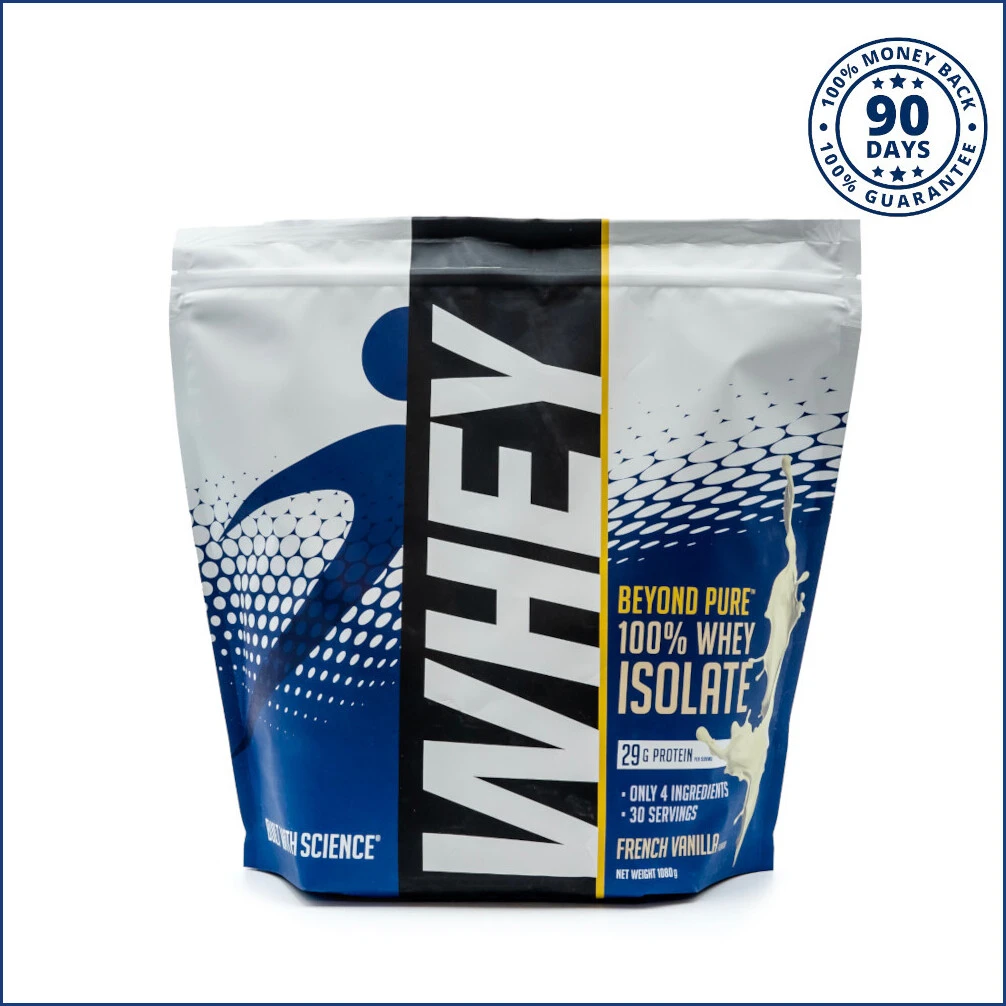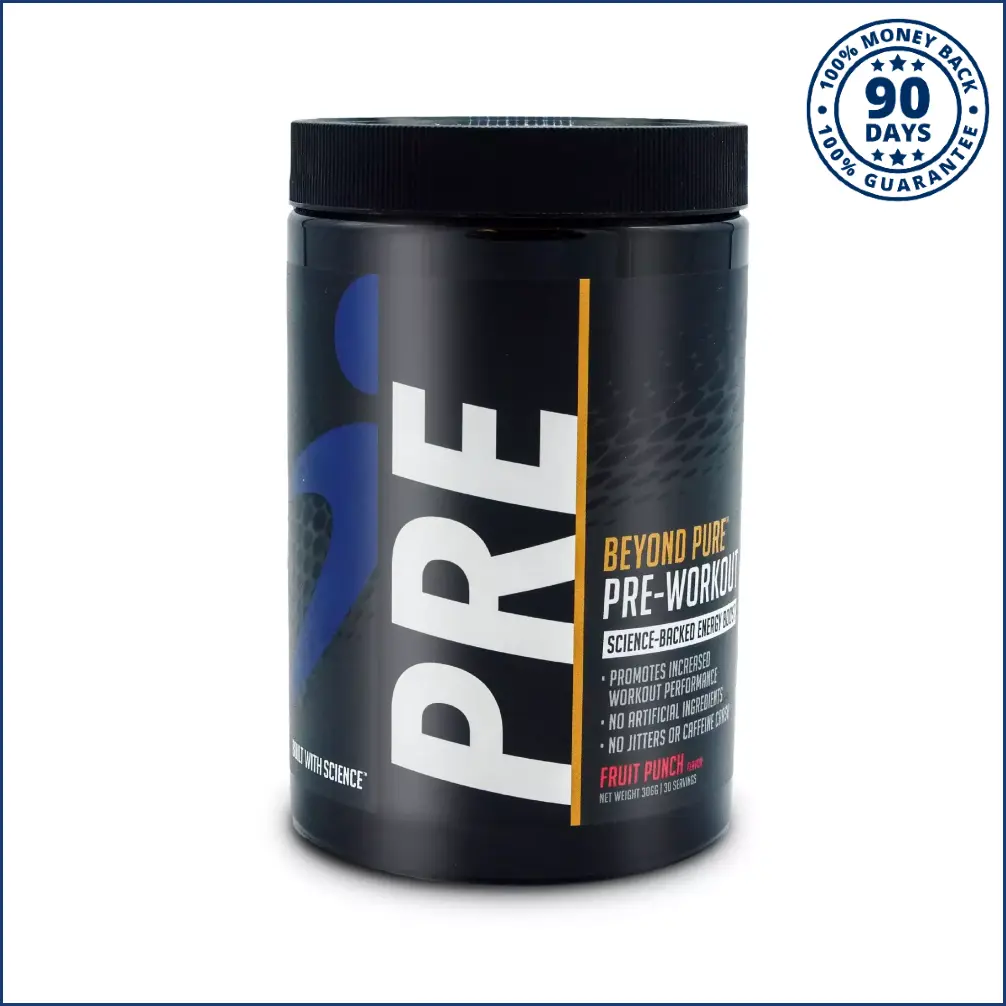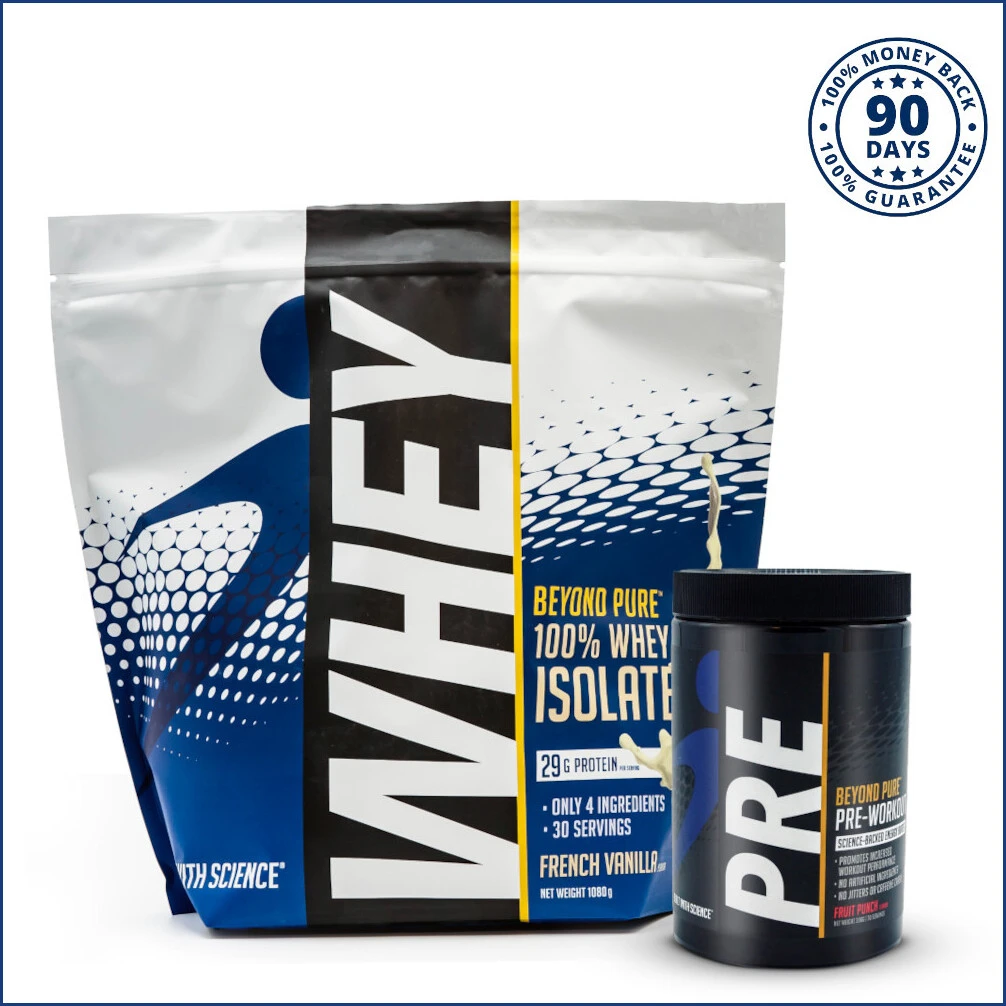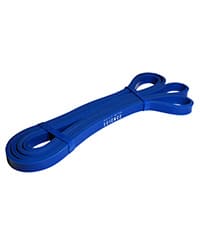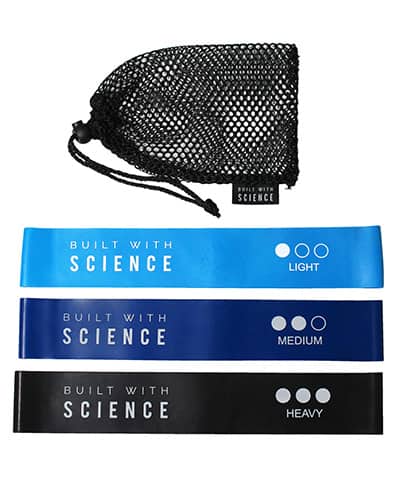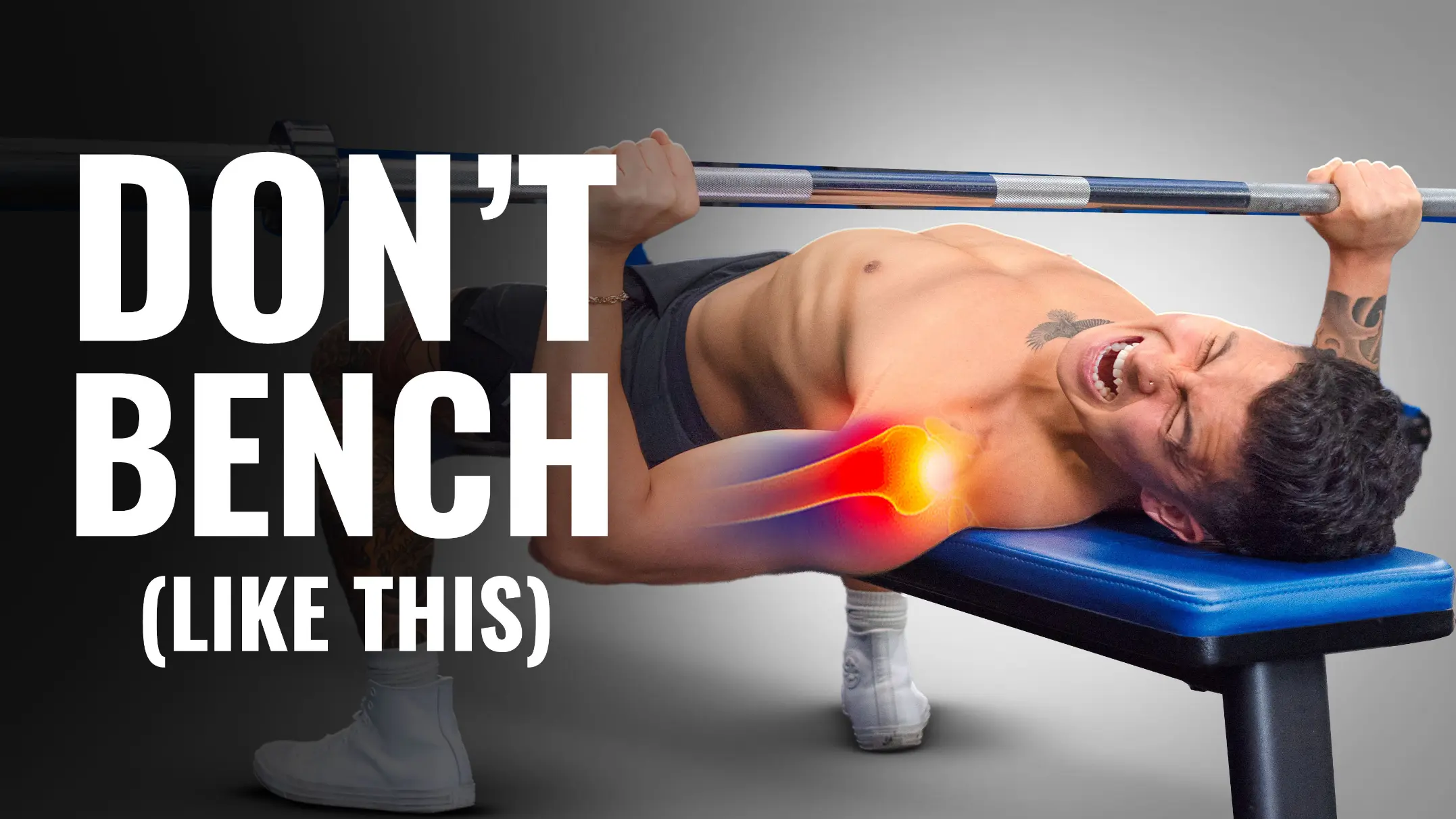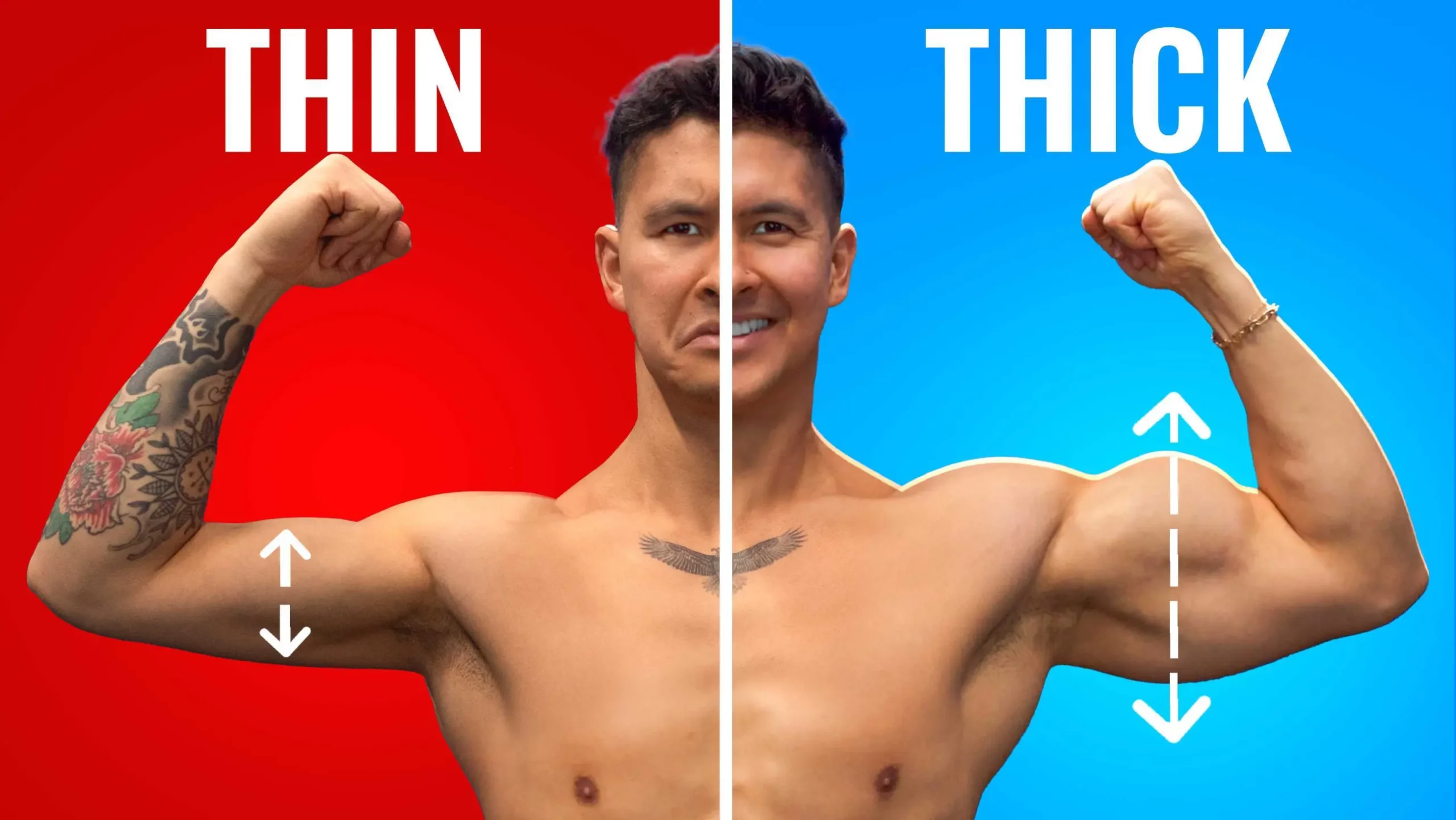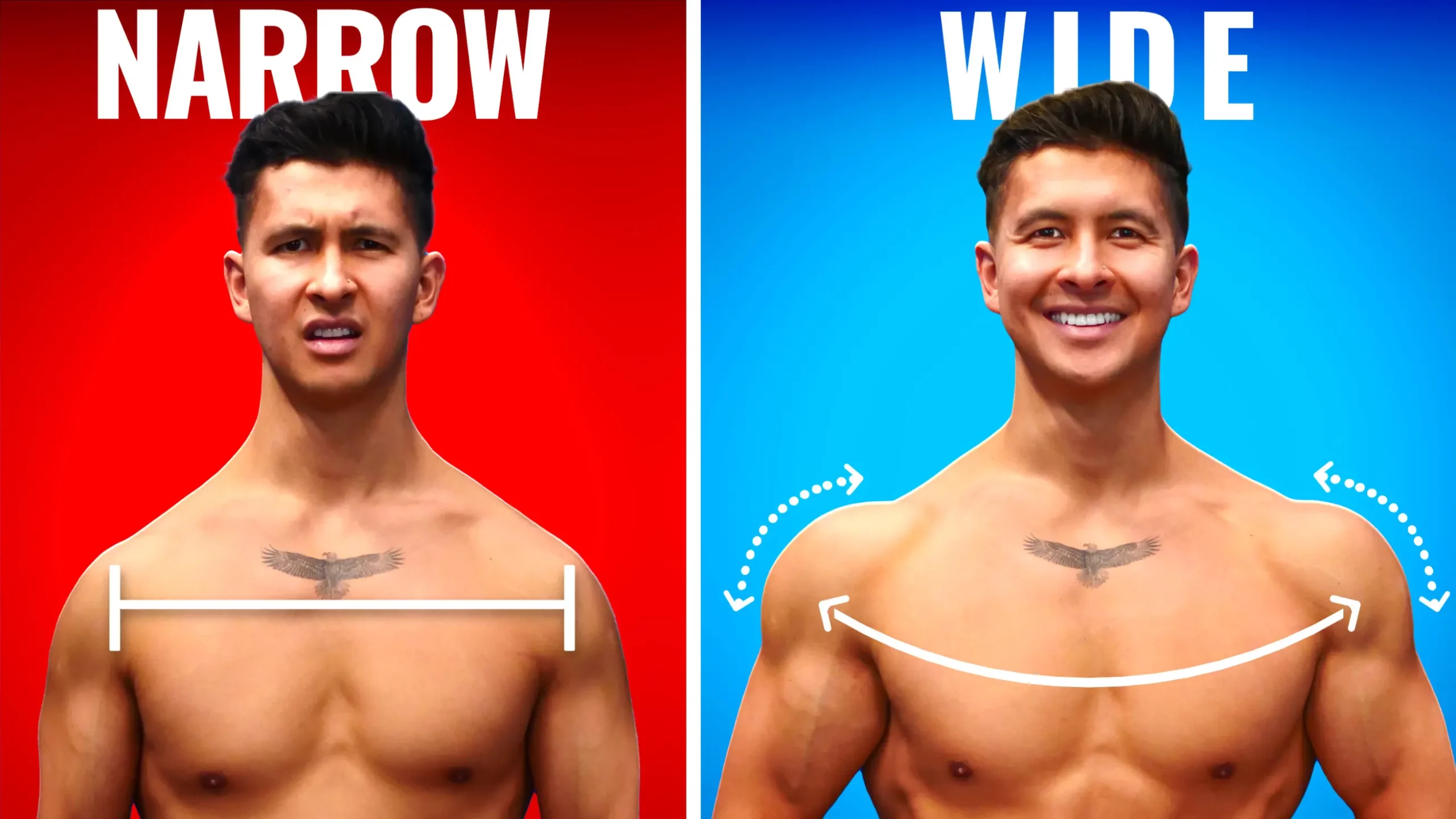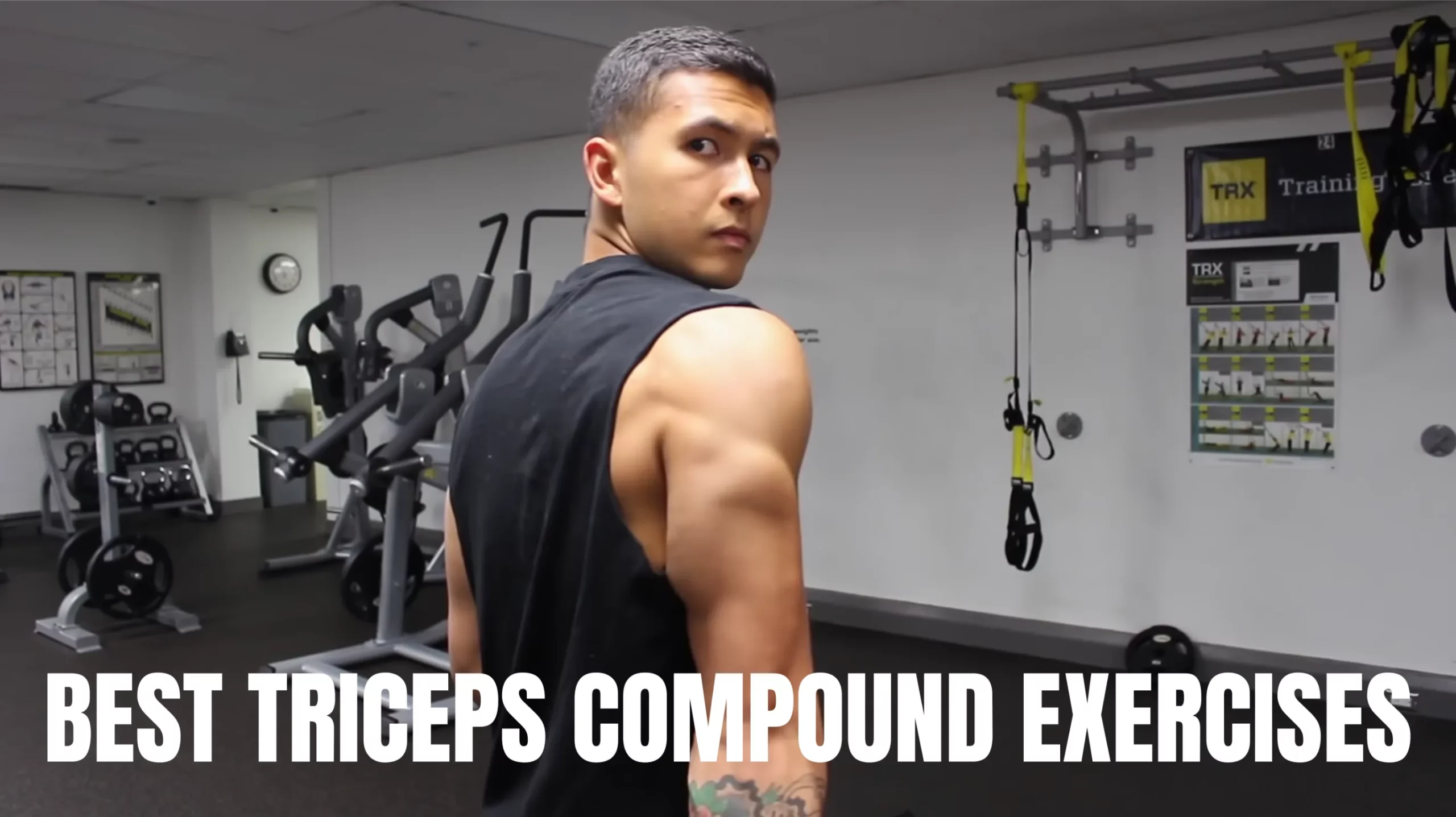
Best Compound Triceps Exercises in 2023 | Built With Science
Best Compound Triceps Exercises
Big biceps + horseshoe-shaped triceps = impressive, sleeves-busting arms.
That’s pretty straightforward.
But do you know what’s not so straightforward? I’ll tell you: it’s the bit about actually getting that much-coveted horseshoe shape to appear at the back of your arms.
See, unlike the biceps, the triceps — which is made up of 3 "heads", the long, lateral, and medial head — is a biarticular muscle. That means it crosses 2 joints instead of 1: the shoulder and elbow joints.
That said, not all 3 heads of the triceps are biarticular.
It’s just the long head, which, unfortunately, happens to be the largest and most visible of them all, that is.
Both the lateral and medial heads only cross the elbow joint, meaning their only function is elbow extension (i.e., straightening of the arm at the elbow). On the other hand, the long head helps with both shoulder and elbow extension.
Now, you may be wondering why I used the word “unfortunately” a few sentences back.
Well, that’s because research shows that your nervous system preferentially recruits monoarticular muscles (i.e., your lateral and medial heads instead of the long head) for most compound exercises because they tend to be more efficient.
In other words, this means most compound triceps exercises won’t optimally grow your long head, which makes up the bulk of your triceps. Like I said, unfortunate.
But there’s good news: “most” doesn’t mean “all”. In this article, I’ll share:
- The compound triceps exercises scientifically proven to hit your long head, plus
- A select others that’ll target your lateral and medial heads for well-rounded triceps development
So, get ready to learn more about triceps exercises here.
What Are The Best Compound Triceps Exercises?
#1: Close-Grip Flat Barbell Bench Press
Equipment needed: Barbell and a bench
Preferentially targets: Lateral and middle heads
What’s special about this exercise?
Chances are, you already know that the flat barbell bench press, like any other pressing movement, is a must-have in some of the best triceps workouts out there.
But what you probably don’t know is just how much it could help to grow your triceps.
Luckily, a 2020 study published in the Journal of Strength and Conditioning Research provides answers. The researchers found that participants who trained only with the flat barbell bench press twice a week for 10 weeks experienced a relative change in cross-sectional area of:
- +7.2% in the lateral head
- +7.3% in the middle head
- +2.1% in the long head
So, the flat barbell bench press is great for the lateral and middle heads but not so much for the long head.
And what about grip width? Well, I’d recommend bringing your hands closer together on the bar — this increases the degree of elbow flexion and extension you go through on the movement, which better emphasizes your triceps.
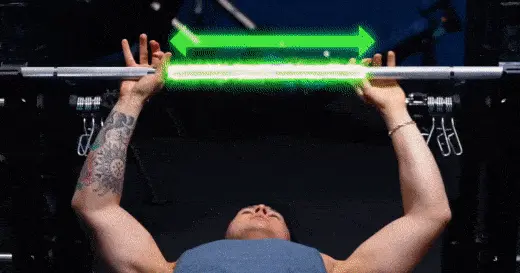
This can be seen in a 2021 study published in Frontiers in Sports and Active Living.
After having the subjects work up to wide, medium, and narrow grip bench press 1RMs during a single testing session (note: the order of grip width was randomized), the researchers found lower EMG readings in the long head of the triceps during wide grip benching than the other 2 grip widths.
And since the researchers also found similar EMG readings for all 3 tricep heads between the medium and narrow grip widths, this means you don’t have to go super narrow.
I’ve found that this tends to cause discomfort to the wrists and elbows for most people. So, ideally, stick with a shoulder-width grip; this should be enough to maximize triceps activation while minimizing stress on your joints.
#2: Neutral Grip Dumbbell Press
Equipment needed: Dumbbells and a bench
Preferentially targets: Lateral and middle heads
What’s special about this exercise?
Still prefer to go narrow on your pressing movements? Or have never been able to perform any barbell chest pressing movements without feeling awkward or experiencing some degree of discomfort?
If so, I'd suggest switching out the barbell for dumbbells instead. You should also use a neutral grip to shift the tension away from your shoulders onto your triceps.
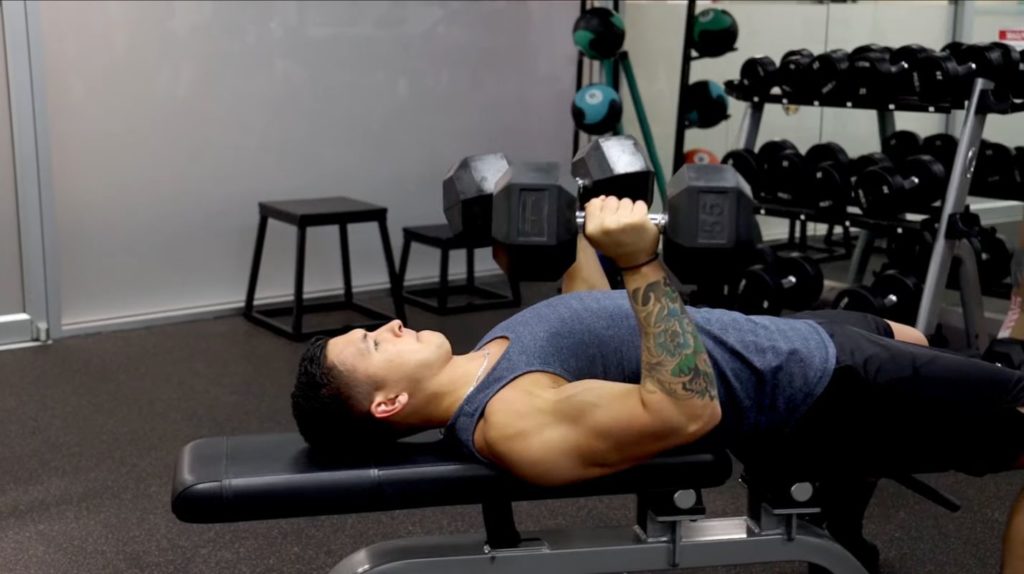
Also, dumbbells could prevent muscular imbalances since each side of your triceps would have to work independently.
Oh, and just so you know: there’s absolutely no need to play around with the angle of your bench.
Flat is best.
According to this EMG study published in the Journal of Strength and Conditioning Research, a flat bench angle produced significantly higher triceps activation than an incline, decline, or vertical angle during pressing movements.
#3: Triceps Dips
Equipment needed: Dip/chin-up machine
Preferentially targets: Lateral and middle heads
What’s special about this exercise?
If you’re looking for another exercise that’ll optimally hit the lateral and middle heads of your triceps that isn’t a press, go with the triceps dips.
Note that form is crucial for this exercise.
Instead of leaning forward, which shifts the tension to your front delts and upper chest, you'd want to maintain a more upright torso throughout the motion.
And to minimize your chances of a shoulder injury, you should also:
- Ensure that your elbows stay tucked against your body throughout the movement, and
- Only lower until your elbows reach 90 degrees
Note: if you struggle to maintain proper form on the bodyweight triceps dips, you could regress it by doing the assisted triceps dips. The same form tips apply.
On the other hand, if you’re able to rep out 30 bodyweight triceps dips without breaking a sweat, make sure you progressively overload by adding weights (e.g., by attaching a weight plate to a dip belt).
#4: Long Head Destruction
Equipment needed: Dumbbells and a bench
Preferentially targets: Long head
What’s special about this exercise?
Living up to its name (long head destruction), this exercise effectively incorporates the 2 main movement functions of the long head: shoulder and elbow extension.
To perform this exercise:
- First, start with your hands held directly above you. Then, lower them to your sides.
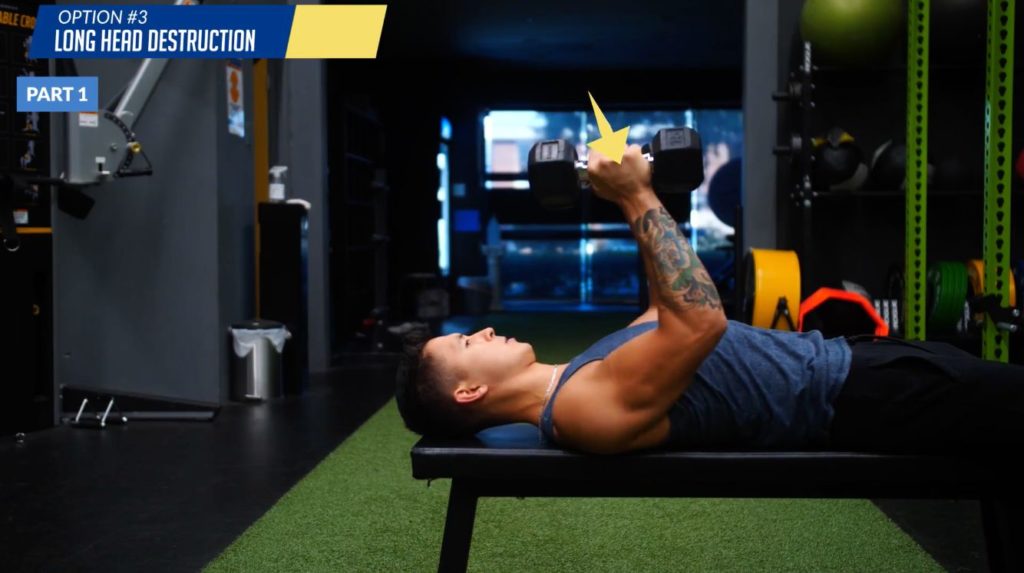
- From here, straighten your arms back behind your body. Now lock your elbows in position.
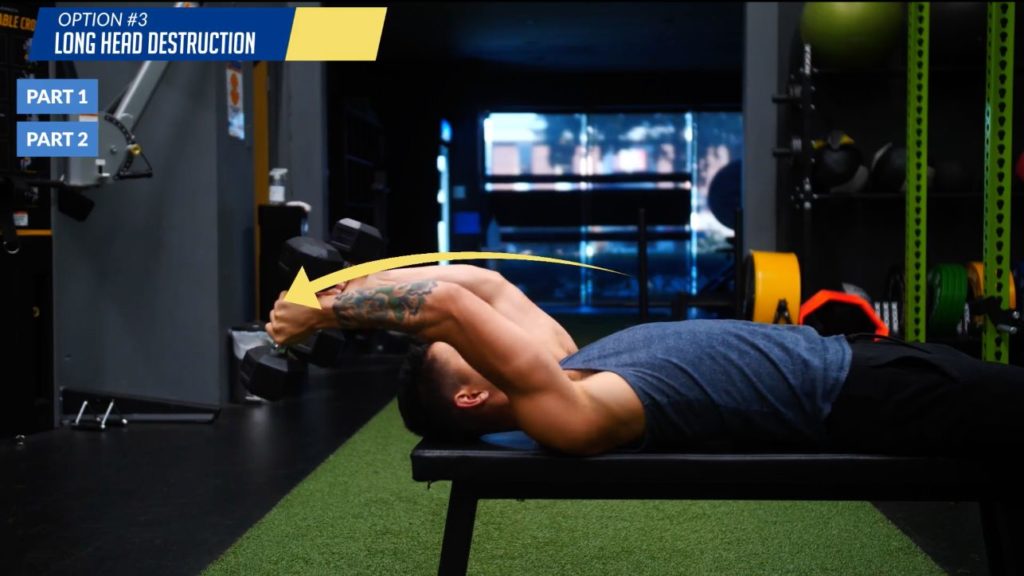
- Next, lower the dumbbells to behind your back before extending them back up again.
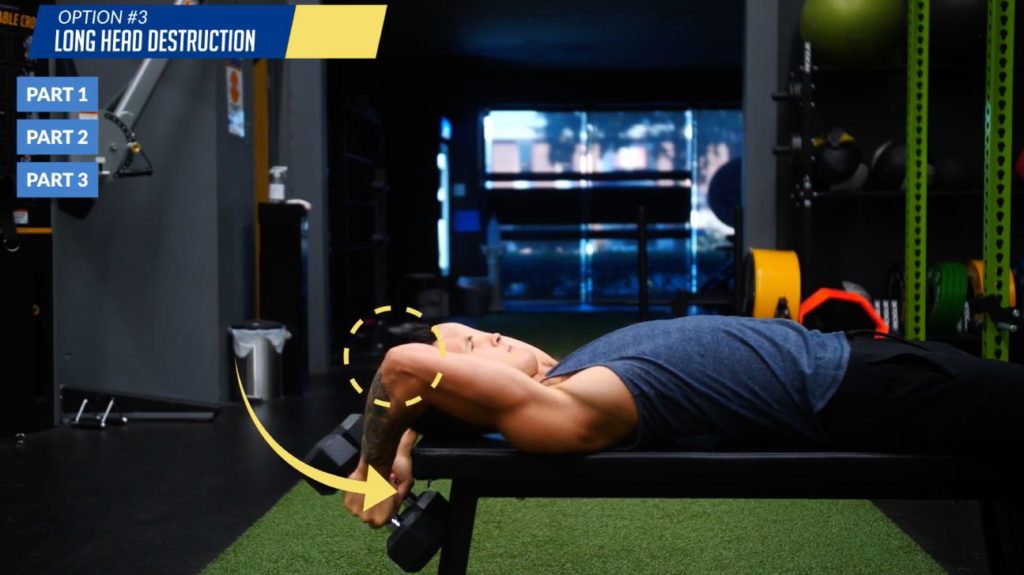
- From here, drive your elbows back to the starting position. Then, straighten your arms up overhead.
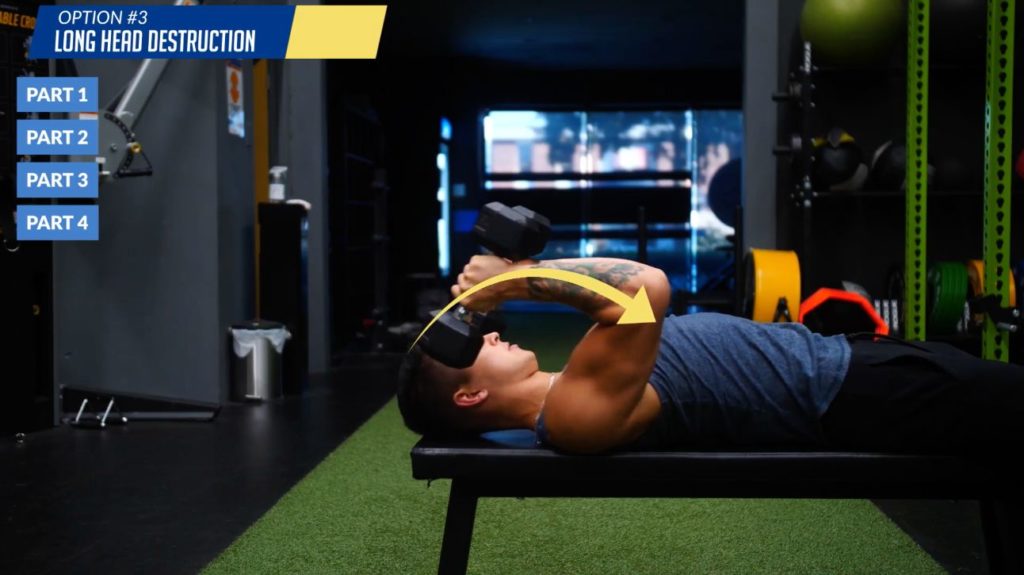
That’s 1 rep. Psst: if you’re having trouble picturing how the exercise is performed, feel free to check out my previous article on some of the best triceps exercises for the long head — I covered long head destruction under “Option 3”.
You can also check out the linked YouTube video within the article for a step-by-step guide.
As you can imagine, you won’t be able to get many reps. But each rep will place a lot of tension (the primary driver of hypertrophy!) on your long head as you move through its various movement functions.
As with all your exercises, focus on control. Use light weights.
And while I've found that using a neutral grip with dumbbells tends to be the best option for most people, please experiment with different grips and ranges of movement to find what feels most comfortable for you and your elbows.
#5: Bench Dips
Equipment needed: A bench (or couch)
Preferentially targets: Lateral and medial heads
What’s special about this exercise?
If you have limited access to gym equipment but would still like to train your lateral and medial heads, there's likely no better option than the behind-the-back bench dips.
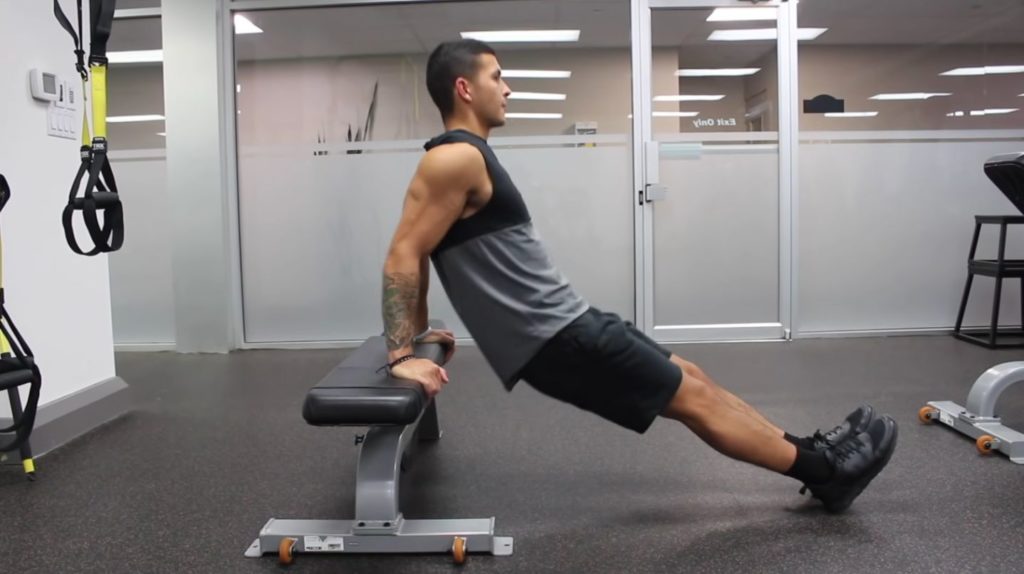
Note: if you're working out at home, find a couch or simply position 2 chairs behind you.
In fact, shockingly, a 2000 EMG study found that bodyweight behind-the-back bench dips outperformed dips done on bars in terms of lateral and medial head activation numbers!
Now, here’s an important disclaimer: more muscle activation doesn’t necessarily lead to more muscle growth. Still, the fact that the bodyweight behind-the-back bench dips led to such high activation readings indicates that it can be a good no-equipment exercise to use to isolate your triceps.
Wondering how to regress/progress the movement? It comes down to your feet’s positioning:
- Level 1: Keep your knees bent in front of you as you descend
- Level 2: Straighten out your legs so you lift a higher percentage of your body weight
- Level 3: Elevate your feet onto another bench or chair
#6: Shoulder-Width Push-Ups
Equipment needed: N/A
Preferentially targets: Lateral and middle heads
What’s special about this exercise?
A bodyweight exercise that effectively targets the lateral and middle heads of your triceps — enough said.
OK, not really. I’ll elaborate.
As with what you’ll see with bench pressing, bringing your hands closer together (till they’re roughly shoulder-width apart) increases elbow flexion and extension, shifting more of the emphasis on your triceps compared to the chest or shoulders.
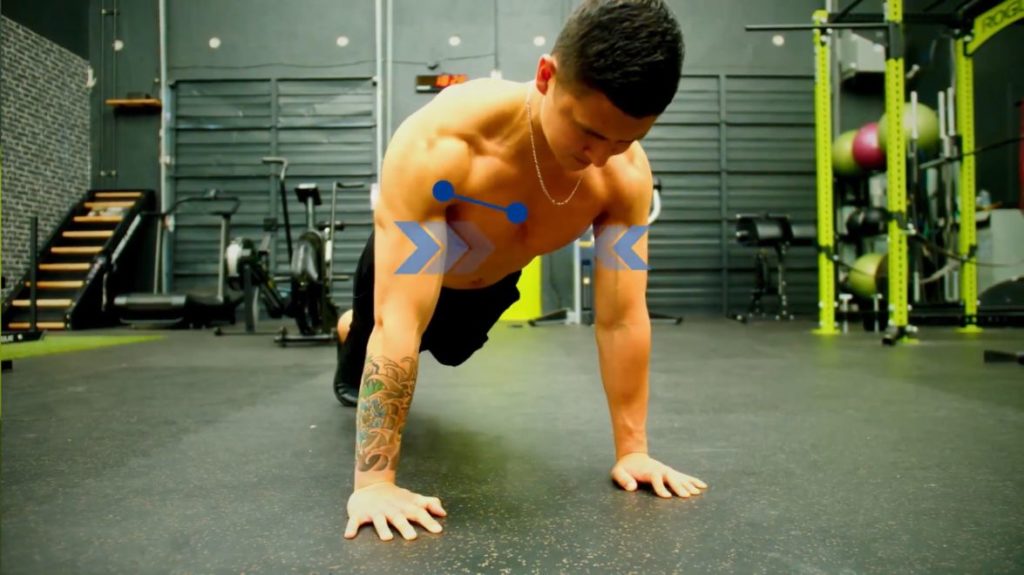
If you experience wrist pain or discomfort during push-ups, using push-up bars or holding 2 dumbbells that allow you to maintain a neutral grip while pressing may help.
To regress the exercise, perform it on your knees. And to ensure progressive overloading, you could increase the number of reps you perform (up to a maximum of 30 reps) and/or add weights to your back.
Special Mention: Guillotine Press And Behind-The-Neck Press
In case you think “special mention” means these triceps compound exercises are worth doing, I’m here to tell you: nope.
I mean, yes, according to the same 2000 EMG study mentioned under bench dips, they may be great at activating the triceps (once again, note that more activation doesn’t mean more muscle growth!):
- The guillotine press is fantastic for the lateral head: It’s the only compound triceps exercise to rank within the top 5 positions — it was third, behind cable push-downs and EZ-bar triceps extensions — with its lateral head activation numbers.
- The behind-the-neck press is fantastic for the long head: It led to the second-highest long head activation numbers, losing to dumbbell kickbacks and tying with EZ-bar triceps extensions (both isolation exercises) when compared to 9 common triceps exercises.
But they’re awfully dangerous.
If you’ve ever seen someone perform the barbell guillotine press, you’d know they’re just a hand slip away from serious injuries … or even death.
That’s because instead of lowering the barbell to the lower chest like in the “traditional” barbell bench press, the guillotine press asks for the barbell to be lowered to the throat. So, imagine failing the lift. Oof.
And that’s not all, by the way.
The exercise also states that you must press with your elbows flared out to your sides. As you probably already know, research shows this actually increases your risk of shoulder injuries (because your shoulders are internally rotated).
Let’s be honest. Considering the risk of death and shoulder injuries, the lateral head activation just isn’t worth it.
Especially since you have so many other lateral-head-focused compound triceps exercises — from barbell bench presses to triceps dips to push-ups — to choose from.
And as for behind-the-neck presses?
Well, despite the exercise being one of the few that does well at targeting the long head of the triceps, I cannot recommend them because most people just aren’t blessed (yep, safe to say, we’re all jealous of Arnold) with the thoracic spine and shoulder mobility needed to perform behind-the-neck presses safely.
Sample Triceps Workout Routine
Here are 2 ways you could put those compound exercises for triceps together for your triceps workout in the gym:
#1: Flat Barbell Bench Press (3 sets, 8-12 reps)
#2: Triceps Dips (3 sets, 8-12 reps)
#3: Shoulder-width push-ups (3 sets, 12-15 reps)
#1: Triceps Dips (3 sets, 8-12 reps)
#2: Flat Close Grip Dumbbell Press (3 sets, 8-12 reps)
#3: Long Head Destruction (3 sets, 6-8 reps)
Fill In The “Gaps” With Isolation Exercises
So, a quick recap of all the triceps compound exercises we’ve covered so far.
Great for lateral and medial heads:
- Close-grip barbell bench press
- Neutral grip dumbbell press
- Triceps dips
- Bench dips
- Shoulder-width push-ups
Great for the long head:
- Long head destruction
Just from this, it’s easy to tell that if you were to only use compound triceps exercises in your training routine, the long head of your triceps would be seriously underdeveloped compared to your lateral and medial heads.
That’s because you’d find it a challenge to hit the training volume required to optimally grow your long head.
So … what now? Well, 2 words: isolation exercises.
Who said you had to stick with 100% compound exercises? There are plenty of triceps isolation exercises that can help bring up the growth of your long head to give you well-rounded triceps development and that much-coveted horseshoe shape.
Examples include overhead cable extensions, incline dumbbell tricep kickbacks, and incline dumbbell overhead extensions.
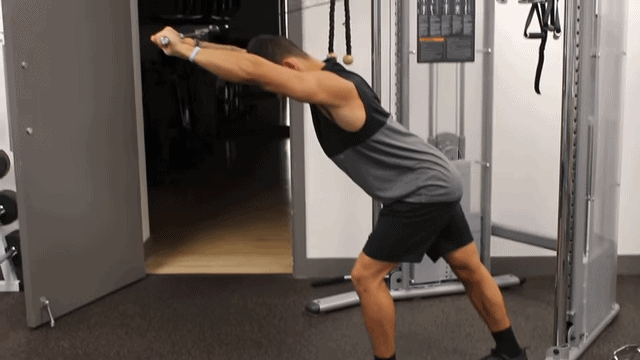
And supporting this is the 2020 study mentioned earlier under close-grip flat barbell bench press.
Previously, I only said that the participants did the bench press.
But that doesn't offer the complete picture of the study. In actuality, the researchers divided the participants into 4 groups:
- Bench press
- Lying triceps extensions
- Bench press, followed by triceps extensions
- Triceps extensions, followed by bench press
Guess what the researchers found after 10 weeks?
That's right: participants in groups 3 and 4 (i.e., those who did bench presses and triceps extensions) reported more well-rounded growth in all heads of the triceps.
This supports the findings of a 2014 study published in the Journal of Strength and Conditioning Research.
The researchers found that the participants who performed a wider variety of compound and isolation exercises experienced more even growth across all 4 heads of the quads — rectus femoris, vastus lateralis, vastus medialis, and vastus intermedius — compared to those who only did squats.
Are Tricep Dips A Compound Exercise?
A compound exercise is one that engages multiple muscle groups across multiple joints.
So, since the triceps dips work a variety of muscle groups — including the triceps, chest, and shoulders — across the shoulder and elbow joints, yes, triceps dips are indeed a compound exercise.
Do You Have To Do Compound Exercises For Triceps?
In most cases, compound exercises allow you to target multiple muscle groups and “heads” of a muscle group at the same time.
For example, the close-grip flat bench press works your shoulders, chest, and triceps — plus, within the triceps, it helps activate both the lateral and medial heads relatively well. Compare that to the isolation exercise, cable push downs, which are known to activate just the lateral head of the triceps very well.
So, sure, you could technically use a variety of isolation exercises to work all the heads of your triceps equally (i.e., to answer the question, no, you don’t have to do compound exercises for triceps) … but it’ll take you more time.
You’ll have to do more sets in the gym. That said, this doesn’t mean you should only use compound exercises to grow your triceps.
See, as showcased in this article, compound exercises tend to lead to subpar activation of biarticular muscles like the long head of the triceps. So, ultimately, you’ll often find that a combination of compound and isolation exercises will work best.
How Do You Work All Triceps?
Bottom line?
To optimally grow all 3 heads of your triceps (and get that drool-worthy horseshoe shape to appear), you'll need to incorporate a mix of isolation and compound triceps exercises into your training routine.
Oh, and beyond focusing on using the proper form and progressively overloading, make sure you:
- Hit them at least 2 to 3 times a week
- Train close to failure
- Fuel your body right (i.e., eat enough calories and protein to put on muscle mass)
If you’re interested in a step-by-step, science-based program that not only shows you how to optimally grow all your muscle groups (not just triceps!) and teaches you how to eat and recover well so you transform your body in the most time-efficient way possible … then take my 30-second analysis quiz to discover the best BWS program for you and your body below:
Click the button below to take my analysis quiz to discover the best program for you:
↓

